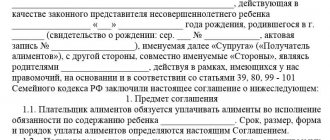State policy is aimed, on the one hand, at protecting motherhood and childhood, ensuring proper maintenance of minor children left in the care of one parent, and on the other, at protecting the interests of people with disabilities, as one of the least protected social groups. Alimony obligations of disabled people is an issue where the interests of these two areas collide. Questions about whether disabled people pay child support and whether alimony is calculated from a disability pension are decided by the legislator, taking into account the interests and needs of both children and their disabled parents. Read about how to pay child support to a disabled child during a divorce in this article.
The procedure for collecting alimony for a disabled child
The order does not distinguish from the general. To collect alimony, the interested person (most often the parent, the organization in which the child is kept) goes to court.
Collection can be initiated:
- By filing a claim
- By filing an application for an order
A statement of claim is filed in cases where there are related requirements that require comprehensive consideration in a court hearing. The result of the consideration is that the plaintiff receives a decision and a writ of execution.
An application for an order simplifies the procedure, but is not always possible in the case of collecting alimony in excess of the statutory portions of earnings.
In addition, the possibility of filing an application for an order depends on the nature of the demand - recovery of a share of earnings, recovery in a lump sum, etc.
Most often, the collection of alimony for a child with special needs occurs by filing a claim and in the following order:
- Filing a claim in court
- Participation in court hearings
- Obtaining a writ of execution
- Submission of a writ of execution to the FSSP with an application to initiate enforcement proceedings
- Participation in enforcement proceedings
LEARN MORE about collecting child support with the help of our lawyer at the link
If a disabled person has retired or started working
The legislation does not provide clear instructions as to what degree of disability a person in need of alimony should have. Even if the spouse has an official place of work, this does not mean that he will be denied payments. The same goes for pensioners.
Take into account:
- salary or pension amount;
- their proportionality to needs;
- the amount of income of a potential alimony payer.
It happens that the small amount of income of a needy person is the basis for demanding alimony payments from the ex-spouse.
Having received a disability pension and having reached retirement age, a person can switch to an old-age pension or remain on the same one - Russian legislation does not allow two pensions at once. An exception is made for disabled people who were injured as a result of hostilities, or participants in the Great Patriotic War who subsequently became disabled.
These categories have the right to demand alimony for their maintenance - voluntarily or judicially.
Documents for collecting alimony for a disabled child
It is necessary to obtain all the evidence:
- the child’s condition (medical report);
- certificate of residence;
- incurring additional expenses by the parent (medical appointments, payment documents, etc.);
- salary certificate;
- the parent’s inability to work due to the need to care for the child and other circumstances;
- financial situation of the parent with whom the child lives;
- all other evidence of the circumstances referred to by the plaintiff.
This is necessary because the court increases the share collected from the earnings of the second parent taking into account the family and financial situation.
The success of the case directly depends on the evidence collected, its reliability and its assessment by the court.
Duration and cost of procedures
An agreement on alimony for the maintenance of disabled people is drawn up and certified by a notary. The time frame for the readiness of an official document can range from one or two days to a week. An important factor is that disabled people of groups I and II pay at a reduced rate for the services of notary offices.
Attention
When concluding an agreement on alimony to support an incapacitated person, citizens are exempted from paying state fees - by 50 percent for all types of notarial acts. (Article 333.38 of the Tax Code of the Russian Federation)
All cases regarding alimony obligations for the maintenance of disabled people are considered in court for no more than a month (clause 2 of article 154 of the Code of Civil Procedure of the Russian Federation). The defendant is given a period of 30 days to appeal the judge's decision.
For all claims relating to alimony to provide for people with disabilities, plaintiffs are exempt from payments to the state budget (Article 333.36 of the Tax Code of the Russian Federation).
Amount of child support for a disabled person
The law establishes the amount of alimony in relation to earnings in the amount of a quarter for one, a third for two and a half for three children.
The amount can be increased at the request of the plaintiff and if there are grounds - financial or marital status.
If the financial situation of the parent with whom the child lives indicates additional expenses, the amount of child support increases. The increase may occur in accordance with the request of the plaintiff, and may also be determined by the court.
In addition, the amount of alimony can be established:
- In shares
- In a flat amount
- Simultaneously in shares and a fixed amount
Decor
Alimony for a disabled person in 2015 can be arranged in two ways.
- Based on an agreement that is voluntarily concluded by husband and wife (including after a divorce), and then certified by a notary.
- Based on a decision of a judicial body , if consensus cannot be reached and it is necessary to resort to the help of the state. The court takes into account the financial situation of each party, as well as other factors, when collecting funds.
Alimony for the mother of a disabled child
If the child’s mother is deprived of the opportunity to work, the second parent may become obligated to support her.
The collection of alimony occurs in legal proceedings initiated by the mother of the child.
At the same time, claims may contain the required amount, but the court will determine their amount based on objective necessity and proof of circumstances.
IMPORTANT : alimony is awarded to a mother caring for a child with a disability only in a fixed amount.
Collection procedure:
- Applying to the court with a claim for the recovery of alimony
- Participation in court proceedings, proof of financial situation and all other circumstances that must be referred to
- Obtaining a court decision and writ of execution
- Submitting a writ of execution and an application to initiate enforcement proceedings to the bailiff service
- Participation in enforcement proceedings
Until the child reaches three years of age, a working mother of a child with a disability can also claim child support.
Is alimony paid from a disability pension?
According to the Decree of the Government of the Russian Federation of July 18, 1996 No. 841, the incapacity for work of the alimony obligee is not a basis for canceling the obligation to support the child, therefore alimony from the disability pension is withheld in any case.
Their size depends on the amount of the benefit and the number of children:
- one child – 25%;
- two children – 33%;
- three children or more – 50%.
If a disabled person continues to work, alimony is collected not only from the pension, but also from the salary. The collection procedure is the same in both cases.
Alimony for a disabled child after 18 years of age
The law establishes the obligation of a parent to support his child until adulthood. However, such an obligation is not due to the child’s disability.
However, disability is a special condition in which a child may be deprived of the opportunity to work or work fully.
Thus, the grounds for assigning alimony to an adult disabled child are:
- Neediness
- Disability
- It should be understood that the status of a disabled child is lost upon reaching the age of 18, and there is a need to obtain a new ITU conclusion.
A parent who lives with a disabled child after 18 years of age and helps him in everyday life is exempt from the obligation to support him financially. The other parent may be assigned alimony in a fixed amount, the amount of which depends on:
- From financial situation
- Marital status
A disabled person of group I or II who has reached the age of 18 has the right to receive alimony from a parent. The size does not depend on the amount of social assistance from the state
A group III disabled person, if he is unable to work full-time, must prove his need to receive alimony.
Disabled person: who is considered as such by law
A disabled person may be considered a person who has a permanent health disorder resulting from illness or injury, which results in the need for social support.
A disabled person cannot take care of himself fully or partially. Depending on the disability group, a person either completely needs outside help, or can meet his needs, but needs additional help.
To obtain the status of a disabled person, a citizen must apply to a special commission, bringing with him a number of documents confirming the impairment of health.
How to increase child support for a disabled child?
Since the court sets the amount of child support based on the financial and marital status of the parties, if the financial situation worsens, the mother can increase the amount of alimony.
In addition, the increase may be associated with additional increased costs for the treatment and rehabilitation of the child, which the parent has to bear.
Procedure for increasing alimony:
- Applying to the court with a claim to increase the previously assigned amount of alimony
- Collection of necessary documents to prove all the circumstances and substantiate the claims
- Obtaining a writ of execution and participation in enforcement proceedings
IMPORTANT : if alimony was assigned to a disabled child in relation to a share of the parent’s earnings, it can be increased by additional collection of alimony in a fixed amount. Read more about increasing alimony with the help of our lawyer at the link.
Going to court
If none of the previous options suits you, then you will have to prepare a statement of claim and other documents. You must include:
- a copy of the birth certificate;
- copy of passport;
- a copy of the marriage or divorce certificate;
- statement of claim;
- copies of receipts and certificates of expenses for the child.
| Calculator of penalties and alimony debt: | |
| Amount of debt today: | rubles |
| Start date of delay: | |
| Until what date are penalties calculated? | |
Penalties at the rate of 0.1% per day for 0 days: 0 rubles
Amount of penalties for all debts: 0 rubles
Total amount of debt (penalty + principal): 0 rubles
In addition, the second spouse can submit documents from his side. If he is disabled, he will show the expert opinion in court. He can also list all his monthly expenses for doctors and medications. On this basis, the court may reduce the amount of alimony. If the defendant has children with other women, this will also affect the amount of payments.
How to reduce the amount of child support for a disabled child?
A reduction in alimony, the obligation to pay which has arisen by agreement, is possible with the conclusion of a new agreement.
If alimony was ordered by the court, it is necessary to initiate the process by filing a claim for a reduction in alimony.
If the plaintiff’s financial and marital status has changed, and he cannot bear alimony obligations in the same amount, the rights of his children or parents are infringed, and alimony may be reduced.
In addition, if a parent considers the amount of alimony to be too high due to the financial and marital status of the second parent, he also has the opportunity to reduce the alimony.
HEALTHY:
Possible options for reducing alimony
It is impossible to completely refuse to support children, but you can slightly reduce the amount of alimony. This is necessary for those people who themselves need outside help. This requires compelling reasons. They can be:
- receipt of profit by a child as a result of labor or entrepreneurial activity (possibly from the age of 16 and the consent of a legal representative);
- the presence of additional income in the recipient’s family (funds from renting out real estate, inheritance, etc.);
- the payer has children who also need to be supported (for example, from a second marriage);
- full transition of the child to state support;
- the presence of several persons as dependents of the payer, as a result of which the total amount of funds paid exceeds the norm allowed by law.
If at least one of these conditions occurs, a payer with disabled status can file a lawsuit to reduce the amount of alimony.
Responsibility for non-payment of alimony
For late payment or evasion of transfer of alimony to support a citizen with a disability, the law provides for certain liability:
- civil law - the debtor is charged a penalty in the amount of 0.5% of the amount of debt for the day of delay if it arose for an unjustifiable reason (Article 115 of the RF IC);
- administrative - provides several options for punishing an evader from paying alimony for the maintenance of a disabled person: a fine, seizure of bank accounts or property, deprivation of a driver's license, a ban on traveling abroad, as well as involvement in correctional labor lasting up to 150 hours or arrest for 10-15 days (Article 5.35.1 of the Code of Administrative Offenses of the Russian Federation);
- criminal - possible only in case of malicious evasion of alimony payments for a long period: arrest for up to 3 months, imprisonment for a year (Article 157 of the Criminal Code of the Russian Federation).
According to Russian legislation, before criminal punishment is applied to a debtor for alimony to provide for the needs of an incapacitated person, administrative measures are used - a fine of 20,000 rubles is imposed. If the person obligated for alimony continues to evade payments in every possible way, then after 2 months a criminal case is opened against him.
Peaceful agreement
An agreement on voluntary payment of alimony for the maintenance of your child is the simplest and most effective way to settle alimony payments. The main condition for its conclusion is the consent of the parties. A peace agreement is a document certified by a notary, which stipulates all the essential conditions for the payment of alimony: their amount, procedure and terms of payment, as well as other conditions. An agreement that is not notarized has no legal force.
This method of resolving disagreements allows parents to provide for all the specifics of paying alimony and, by mutual agreement, establish the amount of payments, which has no upper limits, but cannot be less than determined by law (Article 81 of the RF IC).
Attention! In settlement agreements, you can determine the amount of alimony not only in monetary terms. Maintenance can be paid in movable and immovable property, jewelry and securities, as well as in other ways.
We talked about how voluntary payment of alimony is formalized, as well as about drawing up an agreement and contract between spouses here.
Should a disabled person of groups 1, 2, 3 pay alimony?
Some people mistakenly believe that disability exempts them from paying child support. The Family and Civil Codes of the Russian Federation clearly prescribe the procedure for collecting funds for the maintenance of a minor. They stipulate how alimony is assigned and paid from a disabled person in favor of his children.
Article 80 of the Family Code of the Russian Federation talks about the obligation of parents to support their own children until they reach the age of 18 years. This happens regardless of whether they live together or separately.
A divorce obliges the father (mother) to provide for the child and provide him with financial assistance established by the court. Some citizens have a question: should a disabled person pay alimony. If he must, how does this happen and how much will he be charged?
Income and alimony
The Government of the Russian Federation in Resolution No. 841 of July 18. In 1996, a list of citizens’ incomes subject to deduction of funds for the maintenance of minors was approved. Clause 1 of this document talks about the mandatory collection of alimony from any type of earnings (income).
In paragraph 3 of this List it is noted that material resources in favor of minor citizens are withheld from any type of pension provision and compensation payments.
These include state benefits for people who have lost all or part of their health and are unable to carry out normal work activities. Therefore, alimony from a disabled person is collected in accordance with the general procedure in accordance with the Procedural Code of the Russian Federation.
There are some nuances to this issue. The following alimony payments are not subject to collection:
- benefits for caring for a disabled person (pensioner, child);
- benefits paid for health reasons: temporary disability (on sick leave), pregnancy, childbirth;
- unemployment benefits from the USZN.
Deductions from these incomes are made in special cases by court order, decision or agreement certified by a notary.
Disability group, benefit amount and alimony:
- People with Group III disability can work in a limited manner. They receive a pension from the state, and if they wish, they can work part-time where they can. From both types of income, they are required to pay child support assigned to them by the court or by agreement. The amount of disability benefits for this category in 2021 was 4,215 rubles (for non-workers). Those who work receive an amount 2 times less (the insurance portion).
- Alimony for a group II disabled person who is able to engage in limited work activity is collected from the pension, which in 2021 is paid in the amount of 2,124 rubles for workers and 5,000 rubles for non-workers. Deductions in favor of minors from this benefit are made in accordance with the general procedure.
- Alimony for a group I disabled person, which is given to citizens with complete incapacity for work, is collected in accordance with the PC, based on their state of health. People in this category can work if they have the physical ability to do so. They are usually given a complex diagnosis that significantly limits their ability to work. The amount of social benefits for disabled people of group 1 in 2021 is 10,000 rubles. If a citizen with disabilities officially works part-time, he will receive 8,767 rubles.
Withholding of alimony from a disabled person occurs in accordance with the general procedure in accordance with the Procedural Code of the Russian Federation. Namely: for 1 child - 25% of income, for 2 - 33%, 3 or more - 50%. The amount of payment can be approved in hard monetary terms. This is determined by the court by agreement of both parties.
Attention! Alimony from a person who has become disabled may be collected in an amount below the maximum established by the state. In each individual case, the court determines how much a disabled person will pay his child.
Conditions for reducing the amount of alimony payments
The question often arises: do disabled people of group 1 pay alimony if they themselves need expensive treatment, specialized care, or their illness requires certain financial expenses that do not fit into the amount of the pension. They are obliged to provide financial assistance to the child. But its amount may be different depending on the following circumstances:
- the court will reduce the amount of payment;
- the plaintiff will make a motion to remove the alimony claims, and the court will take this wish into account.
Reduction of alimony payments
There are several points on which the court decides to reduce the amount of payments by a parent with a disability of any group. This is an increase in the disability pensioner’s expenses for medications and medical procedures, a deterioration in the financial situation or a change in family status, namely the appearance of new children, loss of a source of income, etc.
If the child has other sources of income that allow him to fully satisfy his needs, this may also serve as a basis for reducing the amount of maintenance. The list of such grounds includes: the acquisition by a parent who lives with the offspring of real estate or property that provides permanent income; the emergence of new obligations for alimony payments for a disabled pensioner; a decent income of the defendant or if the percentage of the profit is a significant amount that exceeds the needs of the child.
Documentary package for collecting alimony money from a disabled person
In addition to the application, the court will require the provision of a documentary package as evidence and argumentation of the plaintiff’s claims (the list of documents has not changed since 2021):
- identification;
- birth certificate of the child;
- if available: certificate of paternity;
- if available: information regarding the court decision on the fact of adoption;
- divorce certificate;
- information from the house register (certificate of family composition);
- certificate of the plaintiff’s income level;
- information about the level of income of the defendant - a disabled person.
Appointment procedure
Article 80 of the RF IC provides for the possibility of establishing the amount and form of payments by parents in one of the following ways:
- voluntarily by agreement of the parties;
- forcibly - in court.
In the first case, the terms of payments are negotiated by the parties, in the second, the case is considered by the court and, based on the available facts, a decision is made on the amount and form of alimony.
A spouse applying to court for alimony must understand that the ex-husband can file a counterclaim for maintenance payments, provided that he received the disability during the marriage and through no fault of his own.
Dimensions
The Family Code of the Russian Federation obliges parents to pay alimony for the maintenance of minor children in the following amounts:
- for three or more children - half the salary or other source of income (50%) (read what amount can be calculated for four children here);
- for two children - one third (33%);
- per child - one quarter (25%).
You will find more information about the percentage of alimony payments as a share of the payer’s income in this material.







